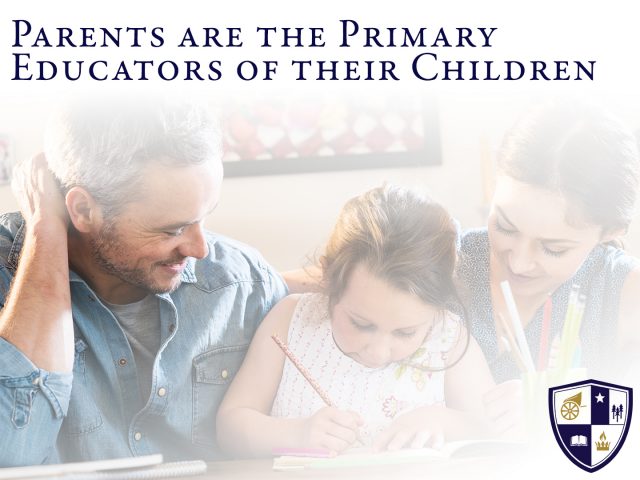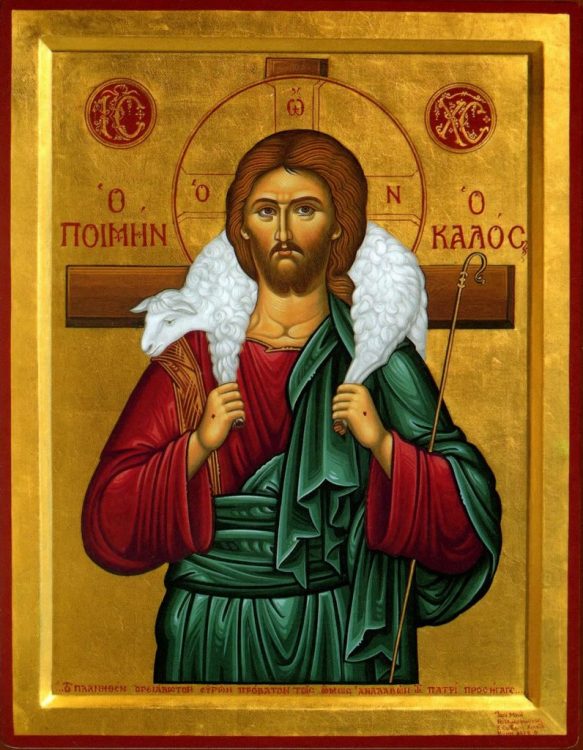Parents Are the Primary Educators of Their Children

The Insidiousness of the Culture of Death
February 27, 2018
The Seven Deadly Sins: Envy
February 27, 2018
By Dr. David Tamisiea, Executive Director, St. Philip Institute of Catechesis and Evangelization, February 26, 2018

Dr. David Tamisiea
The Catholic Church teaches that marriage by its very nature has two primary “ends” or purposes: Marriage by divine design is a covenant between a man and a woman that is for the good of the spouses themselves and for the procreation and education of children (CCC 1601, 2201). This two-fold purpose is not something the Church arbitrarily imposes upon marriage, but rather it is founded upon God’s creative design and plan for marriage. As the book of Genesis reveals, God instituted marriage as an intimate communion of life between a man and a woman that is further ordered to the bringing forth of children into the world: “So God created man in his own image, in the image of God he created him; male and female he created them. And God blessed them, and God said to them, ‘Be fruitful and multiply, and fill the earth and subdue it’ (Gen 1:27–28; cf. Gen 2:18ff).
By divine design, therefore, marriage entails the spouses cooperating with God in both bringing forth new human life and educating the children into adulthood. While being open to having children is itself an essential element of marriage, the parents’ educative task consequent to the birth of the children is also of vital importance for the sake of the children’s growth and development into maturity. Indeed, Scripture is replete with exhortations to parents reminding them of their duty to educate their children in both the Old and New Testaments—e.g., “Train up a child in the way he should go, and when he is old he will not depart from it” (Prov 22:6) and “Fathers, do not provoke your children to anger, but bring them up in the discipline and instruction of the Lord” (Eph 6:4).
The task Christian parents in particular have to provide their children with a sound education was one of the central themes at the Second Vatican Council (1962–1965), and that teaching is still relevant today. In its Declaration on Christian Education, Gravissimum Educationis, the Council emphasizes in the strongest terms that parents have both a right and a duty to educate their own children:
Since parents have conferred life on their children, they have a most solemn obligation to educate their offspring. Hence, parents must be acknowledged as the first and foremost educators of their children. Their role as educators is so decisive that scarcely anything can compensate for their failure in it. For it devolves on parents to create a family atmosphere so animated with love and reverence for God and others that a well-rounded personal and social development will be fostered among children. Hence, the family is the first school of those social virtues which every society needs. … Parents have the first and inalienable duty and right to educate their children. (Gravissimum Educationis 3, 6).
As the Council makes clear, all parents have a fundamental and inalienable right and duty to educate their children, and that right and duty can never be fully delegated to another person or institution. The Church therefore teaches that parents are “the primary educators of their children” (Gravissimum Educationis 3).
What does this mean? To educate literally means “to develop the faculties and powers of a person by teaching, instruction, or schooling.” This word is ultimately derived from two Latin words–ex meaning “out of” and ducere meaning “to draw or to lead.” The underlying idea is that education involves “drawing out” what is best in a person, helping them develop their gifts and to realize their full potential. God, therefore, calls parents as educators of their own children to help the children grow and develop so that they can become their very best selves. The Second Vatican Council in Gravissimum Educationis treats this educative task of parents in a very broad and comprehensive sense to include the child’s physical, intellectual, moral, social, and faith formation (Gravissimum Educationis 1).
But what does the Church mean by calling parents the primary or “first” educators of their children? The most obvious meaning is that parents are the first in the order of time to teach their children about all aspects of life from the moment they enter into the world. But even more fundamentally, parents are the first educators of their children in the sense that they are the ones with the ultimate responsibility for carrying out this task. By divine vocation, the parents have a solemn right and duty to form, develop, and guide their children into adulthood, and this can never be entirely delegated to, or usurped by, anyone else. As St. John Paul II explains, parents “possess a fundamental competence in this area; they are educators because they are parents” (Letter to Families 16). For parents, “the buck stops here” in the education of their children.
Does this mean that the Church teaches that God wants parents to go it alone in the education of their children? Not at all. While the Council in Gravissimum Educationis affirms that the parents’ role is primary, it also recognizes that parents are not obliged to be the exclusive educators of their children. Given the complexities of today’s world and the exponential growth in all areas of knowledge, the Council anticipates that parents will likely need to depend upon others to assist them in educating their children, especially schools. Schools can never wholly replace the educative role of parents, but rather are seen as cooperators who assist parents in fulfilling their task (Gravissimum Educationis 5). Parents cannot simply hand over their children to a school, wipe their hands of the matter, and claim, “well, my job is now done.” Rather, parents must remain actively engaged in their children’s learning and formation and be involved in their schooling. As Pope Francis recently put it in his apostolic exhortation on the family, “Schools do not replace parents, but complement them” (Amoris Laetitia, 84).
As everyone knows, parents today have an array of options to assist them in educating their children, many of which were not available to prior generations: homeschooling materials, Catholic schools, private schools, public schools, online classes, DVD’s, parish-based religious instruction, etc. Out of the many options, though, the Second Vatican Council makes special mention of the importance of Catholic schools forming partnerships with parents to educate their children (Gravissimum Educationis 8). According to the Council, the Catholic school is unique in being able to prepare children to be actively engaged in the affairs of the world, while at the same time formed in the faith so as to advance the Kingdom of God. The aim is that the graduate of a Catholic school “can become, as it were, the saving leaven of the human family” (Gravissimum Educationis, 8). For success in attaining this end, however, the school must be authentically Catholic, and this is determined primarily by the teachers who are the heart and soul of the school. The teachers must be well-trained in their field of study, skilled in teaching, and committed to knowing and living their Catholic faith: “Let teachers realize that to the greatest possible extent they determine whether the Catholic school can bring its goals and undertakings to fruition” (Gravissimum Educationis, 8).
Most important of all, Christian parents have a grave obligation to provide their children with a solid Christian education (Gravissimum Educationis 2). According to St. John Paul II in his apostolic exhortation on the Christian family, Familiaris Consortio, the sacrament of Holy Matrimony “consecrates” the couple for the Christian education of their children (Familiaris Consortio, 38). In other words, the couple who receives the sacrament of Holy Matrimony is in a most sacred manner dedicating themselves to the education of their children in the Christian faith. Through the sacrament, the married couple’s task of educating their children in the Christian faith becomes, as John Paul puts it, a “ministry” that is part of the Church’s saving mission to the world (Familiaris Consortio, 38). The parents become the first evangelizers of their own children. Rather than feeling overwhelmed or daunted, the Christian couple should be confident that they have received from God a treasury of grace in the sacrament of Holy Matrimony that will enable them to carry out this task: “It enriches them with wisdom, counsel, fortitude, and all the other gifts of the Holy Spirit in order to help the children in their growth as human beings and as Christians” (Familiaris Consortio,38). Moreover, the Church is always ready to assist parents in this task of passing on the faith to their children through its catechetical and faith formation programs found in virtually every parish.
What is entailed in a Christian education? For Catholic parents, this means introducing their children to the basic beliefs and tenets of the Church’s faith; teaching them to worship God, especially in the sacred liturgy and in the sacraments; instilling in them good morals and values through instruction and discipline; and showing them how to pray. But here is the thing: Parents cannot give to their children what they themselves do not already possess. Catholic parents, therefore, have a grave duty to educate themselves in the faith in order to effectively pass it on to their own children. Moreover, as St. John Paul points out, parents handing on the faith to their children involves much more than verbal instruction—it is just as much “show” as it is “tell”: “By virtue of their ministry of educating, parents are, through the witness of their lives, the first heralds of the Gospel for their children” (Familiaris Consortio, 39). For this reason, the Second Vatican Council uses the ancient expression “domestic Church” to describe the Christian home as a vibrant center of living radiant faith where parents strive to pass on the faith to their children by word and example, and encourage them to follow the vocation proper to each of them (Lumen Gentium, 11). Catholic parents, then, as the primary educators of their children, must create a Christian home where their children learn and live their faith in an atmosphere of faith, hope, and charity, so that both the parents and the children can become the saints God wants them to be.
__________________________________
David Tamisiea, J.D., Ph.D. — Executive Director
Dr. David Tamisiea is the Executive Director of the St. Philip Institute of Catechesis and Evangelization. Prior to serving as Executive Director of the Institute, Dr. Tamisiea was a professor of theology and the director of the undergraduate theology program at Ave Maria University in Florida.
Dr. Tamisiea’s chief areas of expertise in theology are in ecclesiology and in moral theology, but he also has some expertise in the theology of revelation and the development of doctrine; the relationship between faith and reason; Catholic social teaching; Catholic bioethics; and sacramental and liturgical theology. Dr. Tamisiea’s doctoral dissertation focused on the baptismal priesthood of the christian lay faithful in relation to the Eucharist, and his master’s thesis examined the Catholic idea of a living tradition.
Prior to his graduate studies in theology, Dr. Tamisiea was an attorney for ten years in Dallas, Texas. Dr. Tamisiea also worked in the business world for several years in the pharmaceutical industry. He has a B.A. from the University of Notre Dame, J.D. from the University of Texas Law School, and M.A. and Ph.D. in theology from Ave Maria University in Florida. Dr. Tamisiea and his wife Seana have six children ranging in age from two to twelve. Dr. Tamisiea loves spending time with his family, is a voracious reader, and enjoys exercising in his spare time. Dr. Tamisiea and his family enjoy watching sporting events together, and are devoted Notre Dame football fans.





